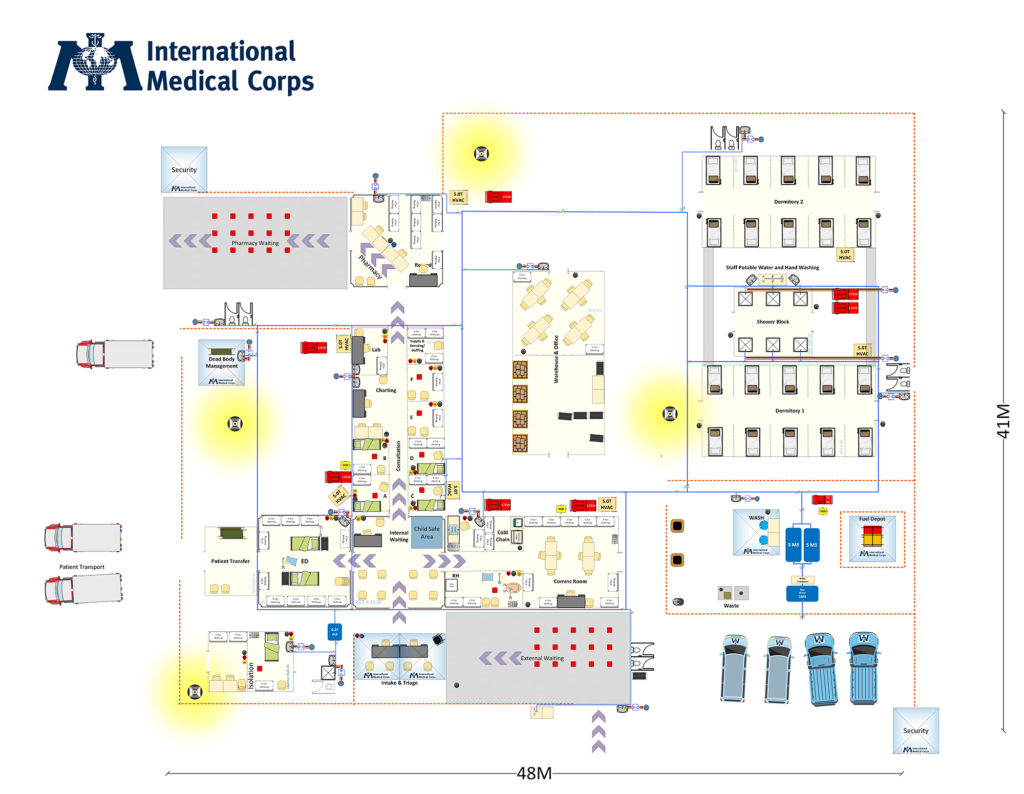The World Health Organization (WHO) has classified humanitarian organization and premier first responder International Medical Corps as an Emergency Medical Team (EMT) Type 1 provider, capable of deploying quickly and providing medical services in response to a disaster anywhere in the world.
The WHO created the EMT concept to standardize medical deployments in the event of a humanitarian crisis. The WHO’s EMT classification process requires that all EMTs commit to clearly defined capabilities and standards. An EMT Type 1 is a self-sufficient outpatient health facility with the trained staff, supplies and systems needed to function in the aftermath of a sudden-onset disaster for at least two weeks before it must be resupplied. Such facilities must be able to be set up and ready to receive patients within 48 hours of an assignment.
During the verification, held June 2–4 at the Texas A&M Engineering Extension Service (TEEX), International Medical Corps deployed a Fixed EMT Type 1, which enables staff to treat a minimum of 100 patients per day, as well as a Mobile EMT Type 1, which enables staff to treat a minimum of 50 patients per day and has the capacity to splinter into two self-sufficient mobile medical units (MMUs). Both types operate during daytime hours only.
Upon classification by the WHO, International Medical Corps became the only non-governmental organization (NGO) in the world to offer both Fixed and Mobile EMT Type 1 capabilities (other than International Medical Corps, only the governments of New Zealand and Norway offer both EMT Type 1 capabilities). It is the first NGO in the US to offer Fixed EMT Type 1 capability, and the second NGO in the US to offer Mobile EMT Type 1 capability.

Download a PDF of the Fixed EMT Type 1 site plan > >
“International Medical Corps has decades of experience responding quickly and effectively to rapid-onset emergencies, saving many thousands of lives,” said Nancy Aossey, President and CEO of International Medical Corps. “Classification by the WHO as an EMT Type 1 provider will enable us to deploy even more efficiently, leveraging the expert teams and proven processes we already have in place.”
“Today, more than a billion people are living in countries affected by long-term humanitarian crises, such as conflict, displacement and natural disasters,” said Ky Luu, Chief Operating Officer of International Medical Corps. “In addition, their health has been adversely affected, both directly and indirectly, by the COVID-19 pandemic. Our classification as an EMT Type 1 will greatly enhance our ability to respond wherever and whenever we are needed, and provide comprehensive care to people in need.”
International Medical Corps’ EMT Type 1 deploys with a team of 21 expatriate personnel, drawn from the organization’s emergency roster of more than 200 trained professionals ready to respond within 48 hours of a sudden-onset disaster. The team comprises two management staff; 11 medical staff; two staff overseeing water, sanitation and hygiene needs; three logistics staff; and three support staff covering finance, human resources and security. Local staff are hired onsite, depending on the context and scope of the emergency.
International Medical Corps’ EMT can respond to a range of emergencies, providing the following services: triage; basic first aid and life support; basic stabilization and referral; initial wound care; basic fracture management; outpatient pain management; minor outpatient surgical procedures; outpatient care for communicable and chronic diseases; basic pediatric care; mental health assessment and referral; rehabilitation screening and referral; rapid diagnostic tests; and pharmacy services. It also can offer basic emergency obstetric care in the Fixed EMT Type 1 facility.
International Medical Corps would like to acknowledge the generous support of the AbbVie Foundation, Airbnb.org, FedEx and the Medtronic Foundation, which helped make the EMT Type 1 classification possible.
About International Medical Corps
In addition to the comprehensive scope of outpatient care provided through the EMT Type 1, International Medical Corps has years of experience responding to emergencies around the world, providing medical services and training that helps those affected by conflict, disaster and disease move from recovery to self-reliance. Since its founding in 1984, the nonprofit has delivered $3.6 billion in lifesaving healthcare services and training to millions of people in more than 80 countries, specializing in emergency response and preparedness; health-system strengthening; women and children’s health; gender-based violence prevention and treatment; nutrition and food security; mental health and psychosocial support (MHPSS); and water, sanitation and hygiene. The organization is also expert in the prevention and treatment of infectious diseases, including polio, measles, cholera, Ebola and COVID-19.
For information about International Medical Corps’ EMT Type 1 classification (including photos or B-roll) or any other aspects of its humanitarian responses around the world, please email media@internationalmedicalcorps.org or visit https://InternationalMedicalCorps.org.